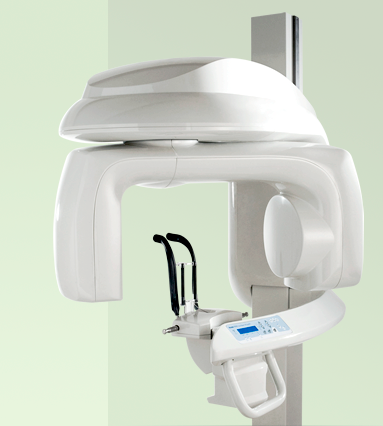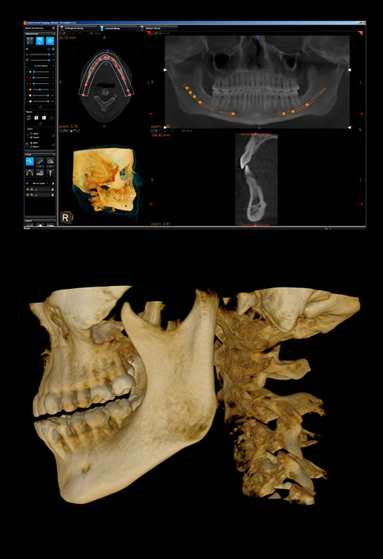 CT Scans are a much safer alternative to traditional CAT scans.
CT Scans are a much safer alternative to traditional CAT scans.
The Altschuler Periodontic and Implant Center takes advantage of our in-office technology called a CBCT Scan to make dental surgery even safer and more predictable.
Our CareStream® 8100 3D Cone Beam CT Scanner gives us the ability to take high-resolution CT scans in the office at a considerable cost and time savings to the patient. The total scan takes less than 25 seconds to produce an easily maneuverable, digital, medium or full-volume CT image. It is fast becoming the new standard of radiographic care for patients.
 What is a CBCT scan?
What is a CBCT scan?
Cone Beam Computed Tomography or CBCT is a safe method to ascertain data for the purpose of diagnosing and treatment planning many dental and medical conditions of the craniofacial region. This is achieved through CBCT’s ability to provide 3-dimensial data of a patient’s craniofacial region including the mandible, maxilla, temporomandibular joint and sinus cavities.
Unlike traditional fan beam CAT scans, CBCT utilizes cone shaped X-ray emissions. The cone shape of the X-ray emission provides volumetric data of subject rather than the sequence of slices provided by traditional CAT scans.
Once the data is collected in can be processed by computer and transformed into a virtual representation of the subject. From this data a virtual mock up of the subject is created. Using computer software an infinite number of views and cross sections can be taken allowing for visualizations of structures which would otherwise be impossible.
Why do I need a CBCT scan?
For the Dentist: The information provided by a Cone Beam Computed Tomography (CBCT) scan is critical for the effective treatment planning of procedures requiring visualization of sub mucosal bone structure and density. Additionally localization of critical structures such as the inferior alveolar nerve and presence of pathology can be determined utilizing CBCT data.
Compared to panoramic films, which can be distorted up to 30%, CBCT has virtually no distortion factor within the craniofacial region. Additionally, panoramic imaging does not allow for the three dimensional visualization leaving out critical information on depth and form of the patient’s bone structure.
For the Patient: If your dentist has recommended a CBCT scan, it is because he or she desires the most complete and accurate information for treatment planning your specific case. A CBCT scan will allow the doctor to analyze bone density, locate critical structures in the jaw, search for pathology, and virtually plan your case prior to surgery. Recommending a patient for a CBCT scan is a sign the doctor is concerned for your care and is taking advantage of the latest in medical technology to ensure that quality care is provided.
How long will the scan take?
A CBCT scan takes only 25 seconds or less to complete. The entire process of registration, scan setup and quality verification will take approximately fifteen to twenty minutes.
Are there any risks?
As a result of the low X-ray exposure associated with CBCT scans they are relatively risk free. CBCT scans utilize only 1/20 the X-ray emissions of traditional CAT scans and therefore are a much safer alternative.

